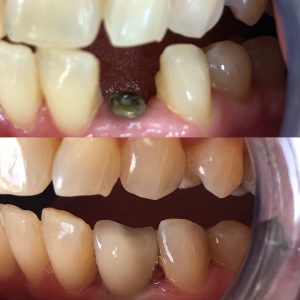Dental Implants: Frequently Asked Questions:

- Do you place your own Implants, and what system do you use? :
Yes I place my own implants. I completed a year long continuing education residency course at UofT for their placement. My chosen Implant system to use is Straumann. It is made in Switzerland and is considered the leading implant system worldwide in the dental field, it’s research and reputation are number One. - Is the Surgery painful?:
Implants are placed under local anaesthetic, similar to having simple dental procedures done such as fillings. My patients have reported that they were quite surprised by the lack of discomfort after surgery, that they went about their normal routine without any complications. At most there might be mild swelling in the area, nothing that shows externally or that a simple Advil or Tylenol can’t help with. We are placing the implant well away from any nerves that would cause any discomfort after the procedure is done. Dental pain patients know of, generally involve teeth with nerves in them. Implants are not near nerves at all, by design. - Are Dental Implants expensive?
Depending on how many implants are necessary, the cost will vary. The long term cost of not replacing bridges and partials will definitely offset the initial investment of one time placement and lifetime use of an implant. At my office, the implant cost is broken up into two payments, Surgical and Restorative. During the surgical, there may be Bone grafting cost if there is a deficiency of bone in addition to the actual surgical placement cost. The restorative cost which is incured approximately 4-6 months later is the cost of the crown and lab fee, which by the way insurance companies are slowly starting to pay for. We wait 4-6 months for proper healing of the bone and osseointegration of the implant. All this will be reviewed at the time of commitment to surgery. - Are there risks?
Depending on the condition of each patient, potential risk factors may vary. Bad oral hygiene, smoking, pre-existing medical conditions such as osteoporosis, uncontrolled diabetes, may reduce the odds of the implant succeeding. A Dentist who has properly evaluated the conditions prior to proceeding with dental models, xrays, surgical stents and review of medical history, should be able to reassure patients. Success rates of dental implants is typically 98%. This is by North American standards, not dental tourism standards. I have seen many poorly placed dental implants without proper pre-treatment work up come into my office from abroad, usually in the patients hands. - How long does the dental implant procedure take?:
Typically in my office, an implant might take 1 hr-to 1.5 hours to place a single implant. It is pain free during the procedure because you are numb with local anaesthetic. Much of the time is the taking of xrays to confirm proper placement, alignment and depth of implant.
For more information, please feel free to schedule a free consultation with Dr. Karen Kassabian (416) 498-9199
